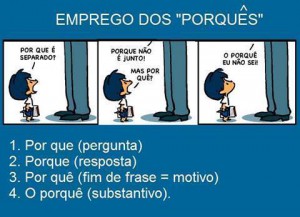Por que, por quê, porque, and porquê all look pretty much the same, but they all mean something different. Show your Portuguese prowess by mastering each of them.
Por que is the basic form. This literally means por qual razão or por qual motivo, or “why.”
Por que você não gosta de chocolate? (Why don’t you like chocolate?)
Por quê is the same as por que, but the acento circunflexo is added when the “why” or motivo is at the end of the sentence.
Você não gosta de chocolate. Por quê? (You don’t like chocolate. Why?)
Porque can literally translate to “because.” In this form, it’s a conjunção explicativa (a conjunction that explains something).
Eu não gosto de chocolate porque é muito doce. (I don’t like chocolate because it’s very sweet.)
Porquê is a substantivo (noun). This is the actual motivo (motive) or razão (reason).
Diga-me um porquê para gostar de chocolate. (Tell me a reason why I should like chocolate.)






